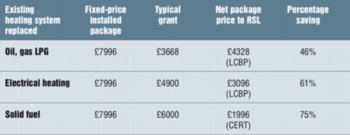Grant schemes to make heat pumps affordable

Carrick Housing in Cornwall has retrofitted 250 homes in 23 locations with heat pumps
Providing a renewable energy heating solution in existing or new homes makes environmental sense but it can be costly. Heat-pump manufacturer Calorex and its strategic partner E.ON, has come up with the solution of delivering a fixed-price ground-source heat-pump installation package supported with grants from either the Low Carbon Buildings Programme (LCBP) or Carbon Emissions Reduction Target (CERT). This could mean, for qualifying installations, up to 85% of grant funding towards the supply and installation of ground-source heat pumps. The package includes a Calorex heat pump, borehole ground heat collector and a specially designed domestic hot-water cylinder matched to the heat pump. Examples of the package and applicable grants based in each case on a 3-bedroom semi-detached house with a 5 kW ground-source heat pump summarised in the table Qualifying rules apply to the grants, and Calorex can give guidance on grants and the technical aspects of the installation. Heat pumps are a long-established technology, simple in operation and with the bonus that no regular maintenance or safety checks are required. The units are quiet and designed for installation within the home. By delivering four units of heat for every unit of electricity they use, their reduction of running costs and carbon emissions is outstanding. Two grant-supported projects for social-housing providers in areas where homes are off the gas network show what can be achieved. One is Carrick Housing, an arms length management organisation (ALMO) in Cornwall. Carrick has retrofitted 250 homes in 23 locations with heat pumps. Calorex ground-source Heat Plant units of 3·4 and 5·0 kW rating have been used. They serve radiator and a storage cylinder in each home to provide full heating and hot water. Over 18 km of bore holes were drilled by Earth Energy and fitted with 36 km of heat transfer pipe. Grant support was provided by E.ON.

Grants available for qualifying social-housing schemes of up to 75% make a massive difference on the cost of a ground-source heat-pump installation.
The homes have had at least one winter’s operation, and in some cases two. Carrick has monitored tenant reaction to the heat pumps and has had positive feedback, with over 90% expressing ‘high satisfaction’. Energy use and CO2 reduction have been separately assessed in a study by Exeter University, which reported a CO2 reduction of 3·5 t per house per year — a fall of 73% from previous emissions. At the other side of the country, Mid Suffolk District Council adopted a similar approach for a scheme of 16 bungalows in the village of Stradbroke, again without gas. Under the council’s Decent Home Plus objectives, eliminating electric heating was a target. Oil was not a technical option due to tank siting and delivery. There were also fears that tenants might not be able to budget for large oil bills and would react by not using the system. NPS Property Consultants, working with the council, chose a ground-source system, again with E.ON providing grant support, and using Calorex Heat Plant equipment. The heating side is based on radiators and a pressurised 210 litre hot water storage cylinder. NPS has monitored tenant reaction over the last two years. This has shown that tenants, many of whom are elderly, are staying warm and their lower fuel bills are in line with their expectations. These two examples show how heat pumps can deliver year-round comfort at running costs that are within the limited budgets of social-housing tenants. With grants from the CERT and Low Carbon Buildings programmes for qualifying social-housing schemes totalling up to 85% of the cost, the capital outlay for heat-pump installations also compares favourably with conventional heating systems. For social-housing providers and their tenants, heat pumps now provide an affordable solution.
Related links:
Related articles:




